Organisational Behaviour Report: 4com plc, Leadership and Culture
VerifiedAdded on 2020/10/05
|15
|4547
|466
Report
AI Summary
This report examines organisational behaviour within the telecommunications firm 4com plc. It begins by exploring the influence of power, culture, and politics on employee behaviour and organizational performance, discussing various types of power (coercive, reward, legitimate, referent, expert, and informational) and their impact. The report then delves into organizational culture, using Handy's typology (power, role, task, and person cultures) to analyse its impact. Next, the report covers content and process theories of motivation, including McClelland's need theory (need for power, affiliation, and achievement) and Vroom's expectancy theory. Finally, it evaluates team dynamics, discussing the characteristics of effective and ineffective teams and concludes by summarizing the philosophies and concepts of organizational behaviour and how they can effectively achieve team goals within the firm.
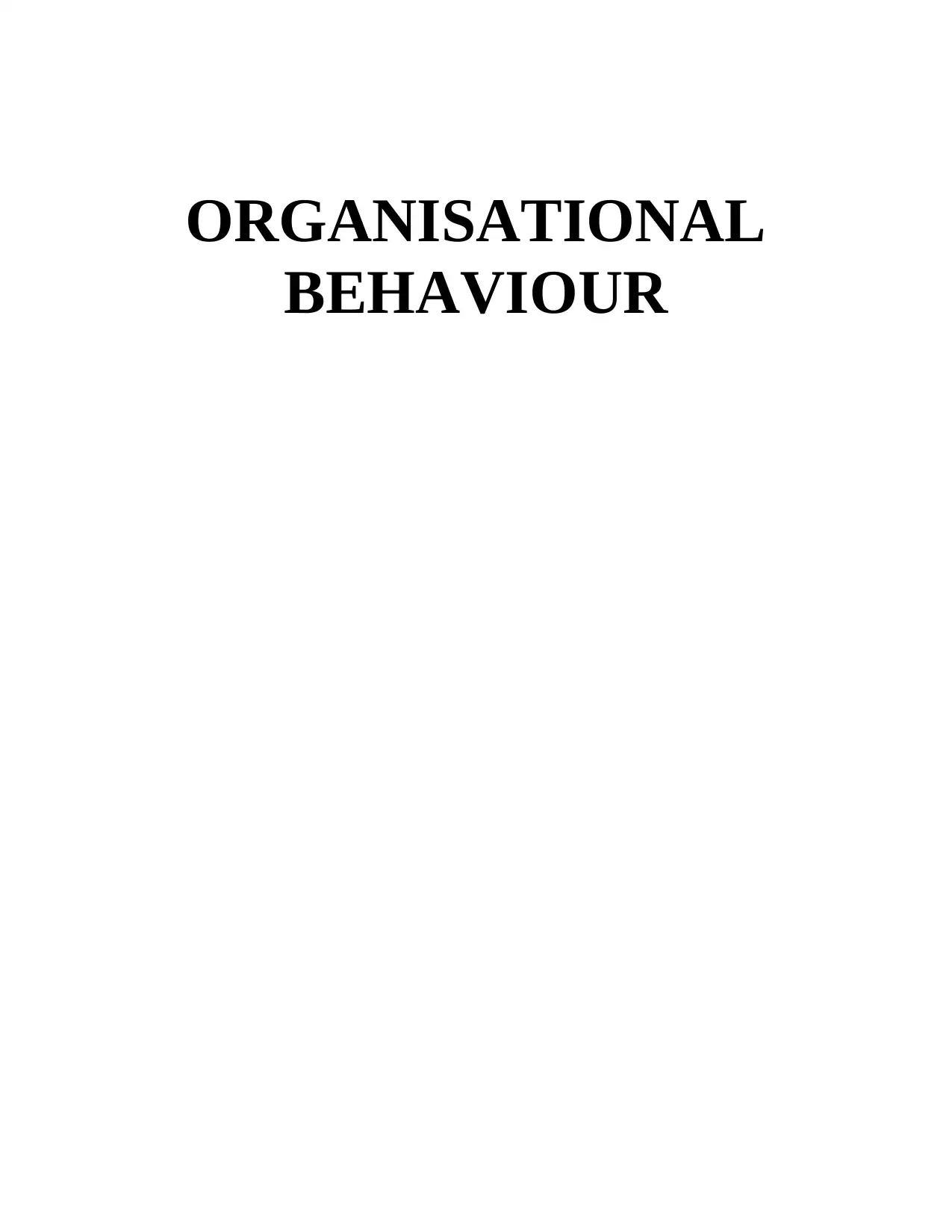
ORGANISATIONAL
BEHAVIOUR
BEHAVIOUR
Paraphrase This Document
Need a fresh take? Get an instant paraphrase of this document with our AI Paraphraser
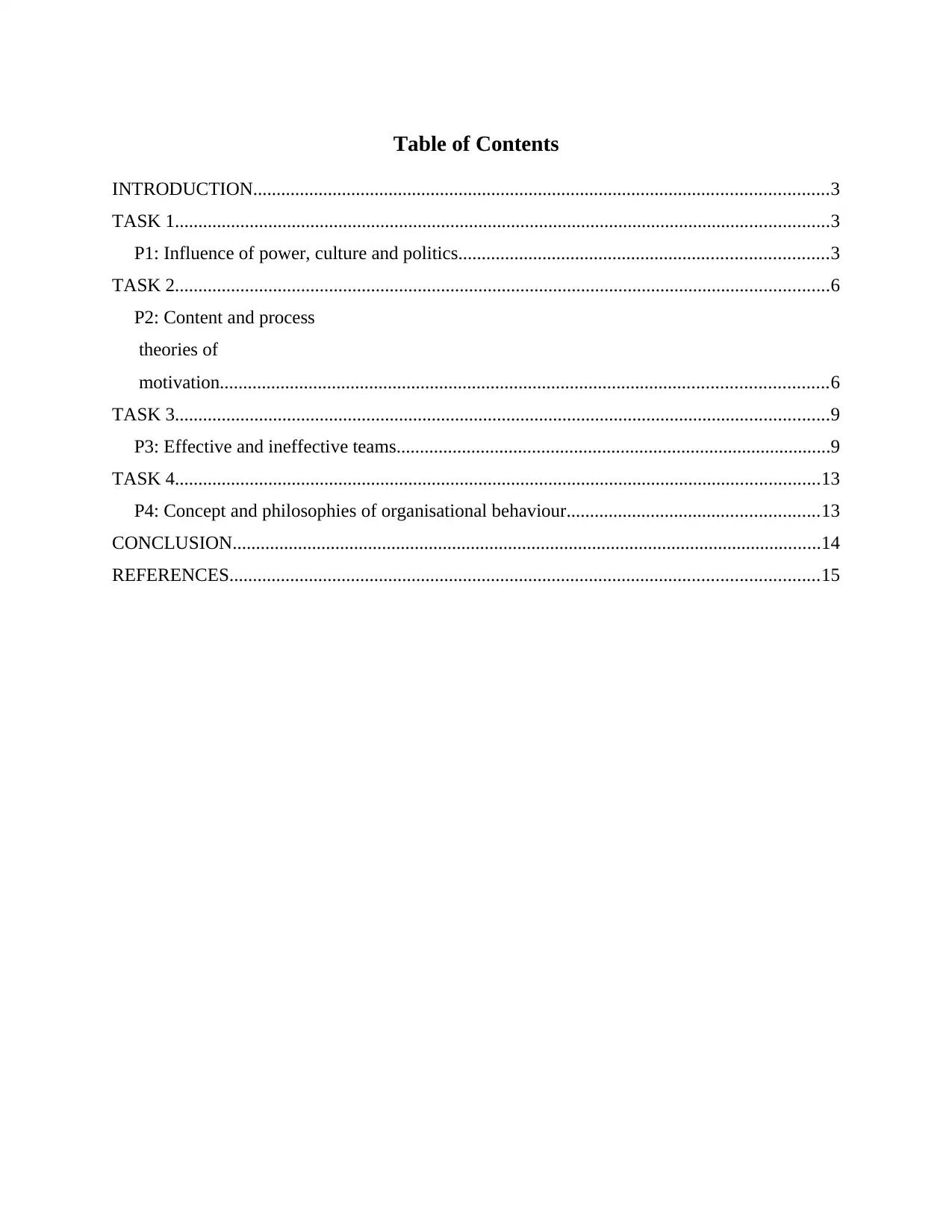
Table of Contents
INTRODUCTION...........................................................................................................................3
TASK 1............................................................................................................................................3
P1: Influence of power, culture and politics...............................................................................3
TASK 2............................................................................................................................................6
P2: Content and process
theories of
motivation..................................................................................................................................6
TASK 3............................................................................................................................................9
P3: Effective and ineffective teams.............................................................................................9
TASK 4..........................................................................................................................................13
P4: Concept and philosophies of organisational behaviour......................................................13
CONCLUSION..............................................................................................................................14
REFERENCES..............................................................................................................................15
INTRODUCTION...........................................................................................................................3
TASK 1............................................................................................................................................3
P1: Influence of power, culture and politics...............................................................................3
TASK 2............................................................................................................................................6
P2: Content and process
theories of
motivation..................................................................................................................................6
TASK 3............................................................................................................................................9
P3: Effective and ineffective teams.............................................................................................9
TASK 4..........................................................................................................................................13
P4: Concept and philosophies of organisational behaviour......................................................13
CONCLUSION..............................................................................................................................14
REFERENCES..............................................................................................................................15
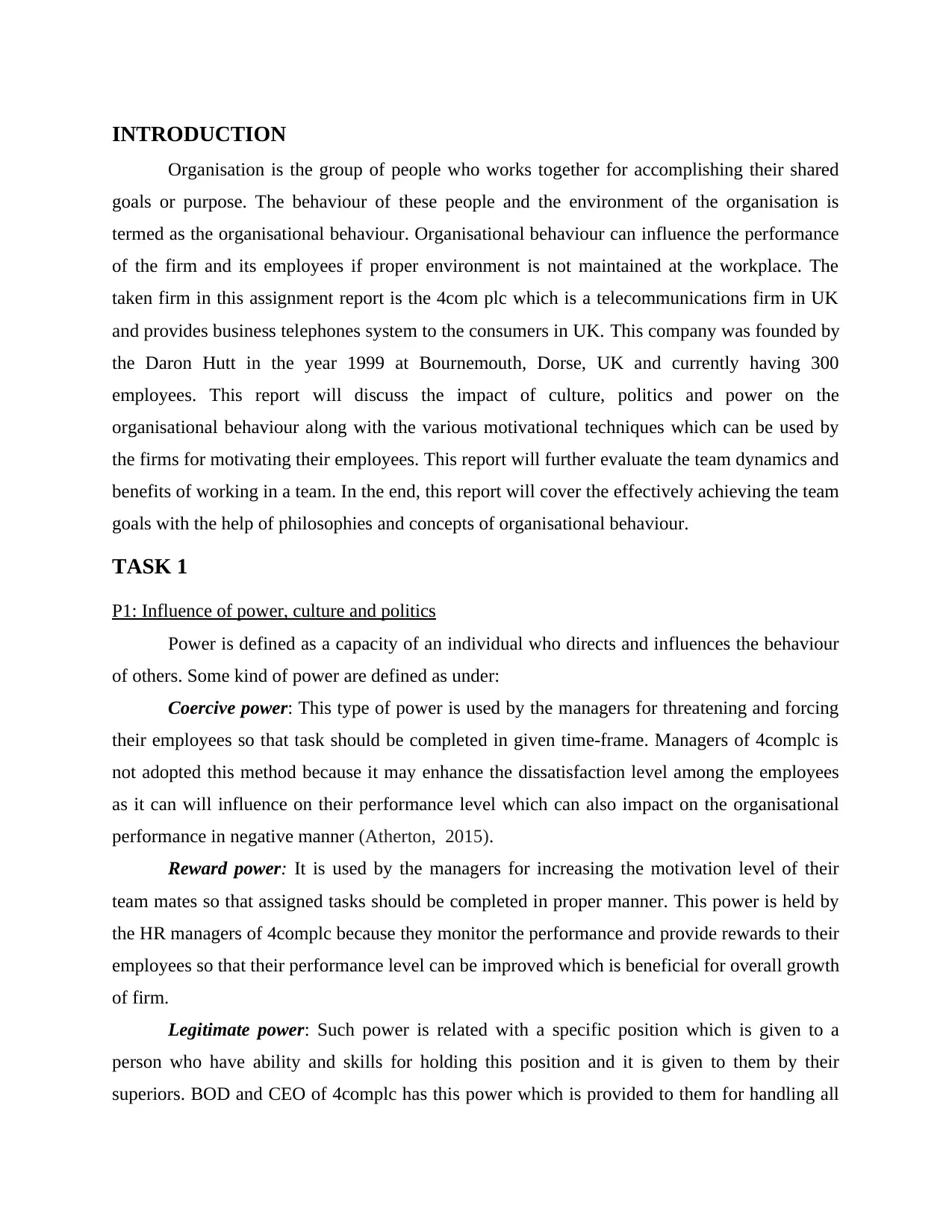
INTRODUCTION
Organisation is the group of people who works together for accomplishing their shared
goals or purpose. The behaviour of these people and the environment of the organisation is
termed as the organisational behaviour. Organisational behaviour can influence the performance
of the firm and its employees if proper environment is not maintained at the workplace. The
taken firm in this assignment report is the 4com plc which is a telecommunications firm in UK
and provides business telephones system to the consumers in UK. This company was founded by
the Daron Hutt in the year 1999 at Bournemouth, Dorse, UK and currently having 300
employees. This report will discuss the impact of culture, politics and power on the
organisational behaviour along with the various motivational techniques which can be used by
the firms for motivating their employees. This report will further evaluate the team dynamics and
benefits of working in a team. In the end, this report will cover the effectively achieving the team
goals with the help of philosophies and concepts of organisational behaviour.
TASK 1
P1: Influence of power, culture and politics
Power is defined as a capacity of an individual who directs and influences the behaviour
of others. Some kind of power are defined as under:
Coercive power: This type of power is used by the managers for threatening and forcing
their employees so that task should be completed in given time-frame. Managers of 4complc is
not adopted this method because it may enhance the dissatisfaction level among the employees
as it can will influence on their performance level which can also impact on the organisational
performance in negative manner (Atherton, 2015).
Reward power: It is used by the managers for increasing the motivation level of their
team mates so that assigned tasks should be completed in proper manner. This power is held by
the HR managers of 4complc because they monitor the performance and provide rewards to their
employees so that their performance level can be improved which is beneficial for overall growth
of firm.
Legitimate power: Such power is related with a specific position which is given to a
person who have ability and skills for holding this position and it is given to them by their
superiors. BOD and CEO of 4complc has this power which is provided to them for handling all
Organisation is the group of people who works together for accomplishing their shared
goals or purpose. The behaviour of these people and the environment of the organisation is
termed as the organisational behaviour. Organisational behaviour can influence the performance
of the firm and its employees if proper environment is not maintained at the workplace. The
taken firm in this assignment report is the 4com plc which is a telecommunications firm in UK
and provides business telephones system to the consumers in UK. This company was founded by
the Daron Hutt in the year 1999 at Bournemouth, Dorse, UK and currently having 300
employees. This report will discuss the impact of culture, politics and power on the
organisational behaviour along with the various motivational techniques which can be used by
the firms for motivating their employees. This report will further evaluate the team dynamics and
benefits of working in a team. In the end, this report will cover the effectively achieving the team
goals with the help of philosophies and concepts of organisational behaviour.
TASK 1
P1: Influence of power, culture and politics
Power is defined as a capacity of an individual who directs and influences the behaviour
of others. Some kind of power are defined as under:
Coercive power: This type of power is used by the managers for threatening and forcing
their employees so that task should be completed in given time-frame. Managers of 4complc is
not adopted this method because it may enhance the dissatisfaction level among the employees
as it can will influence on their performance level which can also impact on the organisational
performance in negative manner (Atherton, 2015).
Reward power: It is used by the managers for increasing the motivation level of their
team mates so that assigned tasks should be completed in proper manner. This power is held by
the HR managers of 4complc because they monitor the performance and provide rewards to their
employees so that their performance level can be improved which is beneficial for overall growth
of firm.
Legitimate power: Such power is related with a specific position which is given to a
person who have ability and skills for holding this position and it is given to them by their
superiors. BOD and CEO of 4complc has this power which is provided to them for handling all
⊘ This is a preview!⊘
Do you want full access?
Subscribe today to unlock all pages.

Trusted by 1+ million students worldwide
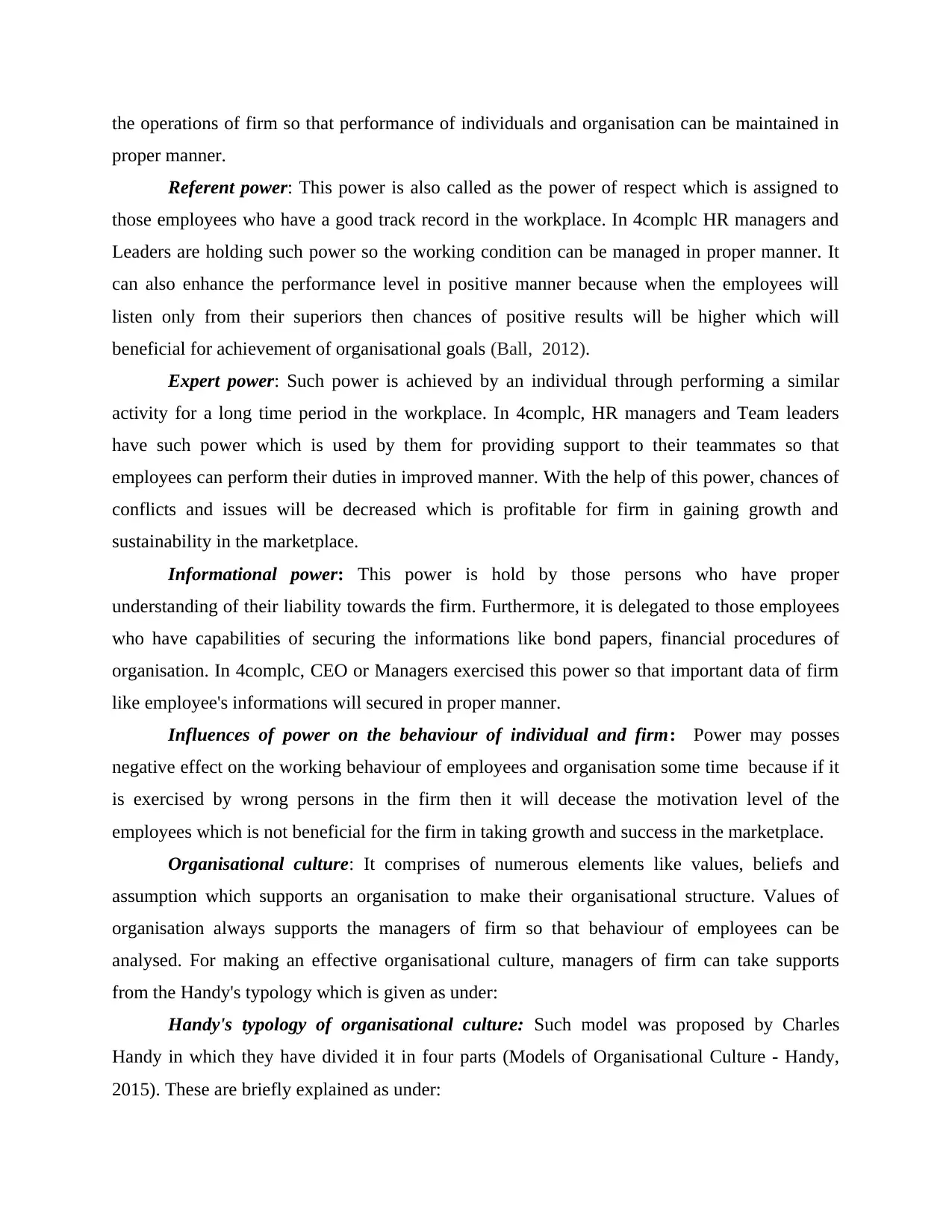
the operations of firm so that performance of individuals and organisation can be maintained in
proper manner.
Referent power: This power is also called as the power of respect which is assigned to
those employees who have a good track record in the workplace. In 4complc HR managers and
Leaders are holding such power so the working condition can be managed in proper manner. It
can also enhance the performance level in positive manner because when the employees will
listen only from their superiors then chances of positive results will be higher which will
beneficial for achievement of organisational goals (Ball, 2012).
Expert power: Such power is achieved by an individual through performing a similar
activity for a long time period in the workplace. In 4complc, HR managers and Team leaders
have such power which is used by them for providing support to their teammates so that
employees can perform their duties in improved manner. With the help of this power, chances of
conflicts and issues will be decreased which is profitable for firm in gaining growth and
sustainability in the marketplace.
Informational power: This power is hold by those persons who have proper
understanding of their liability towards the firm. Furthermore, it is delegated to those employees
who have capabilities of securing the informations like bond papers, financial procedures of
organisation. In 4complc, CEO or Managers exercised this power so that important data of firm
like employee's informations will secured in proper manner.
Influences of power on the behaviour of individual and firm: Power may posses
negative effect on the working behaviour of employees and organisation some time because if it
is exercised by wrong persons in the firm then it will decease the motivation level of the
employees which is not beneficial for the firm in taking growth and success in the marketplace.
Organisational culture: It comprises of numerous elements like values, beliefs and
assumption which supports an organisation to make their organisational structure. Values of
organisation always supports the managers of firm so that behaviour of employees can be
analysed. For making an effective organisational culture, managers of firm can take supports
from the Handy's typology which is given as under:
Handy's typology of organisational culture: Such model was proposed by Charles
Handy in which they have divided it in four parts (Models of Organisational Culture - Handy,
2015). These are briefly explained as under:
proper manner.
Referent power: This power is also called as the power of respect which is assigned to
those employees who have a good track record in the workplace. In 4complc HR managers and
Leaders are holding such power so the working condition can be managed in proper manner. It
can also enhance the performance level in positive manner because when the employees will
listen only from their superiors then chances of positive results will be higher which will
beneficial for achievement of organisational goals (Ball, 2012).
Expert power: Such power is achieved by an individual through performing a similar
activity for a long time period in the workplace. In 4complc, HR managers and Team leaders
have such power which is used by them for providing support to their teammates so that
employees can perform their duties in improved manner. With the help of this power, chances of
conflicts and issues will be decreased which is profitable for firm in gaining growth and
sustainability in the marketplace.
Informational power: This power is hold by those persons who have proper
understanding of their liability towards the firm. Furthermore, it is delegated to those employees
who have capabilities of securing the informations like bond papers, financial procedures of
organisation. In 4complc, CEO or Managers exercised this power so that important data of firm
like employee's informations will secured in proper manner.
Influences of power on the behaviour of individual and firm: Power may posses
negative effect on the working behaviour of employees and organisation some time because if it
is exercised by wrong persons in the firm then it will decease the motivation level of the
employees which is not beneficial for the firm in taking growth and success in the marketplace.
Organisational culture: It comprises of numerous elements like values, beliefs and
assumption which supports an organisation to make their organisational structure. Values of
organisation always supports the managers of firm so that behaviour of employees can be
analysed. For making an effective organisational culture, managers of firm can take supports
from the Handy's typology which is given as under:
Handy's typology of organisational culture: Such model was proposed by Charles
Handy in which they have divided it in four parts (Models of Organisational Culture - Handy,
2015). These are briefly explained as under:
Paraphrase This Document
Need a fresh take? Get an instant paraphrase of this document with our AI Paraphraser
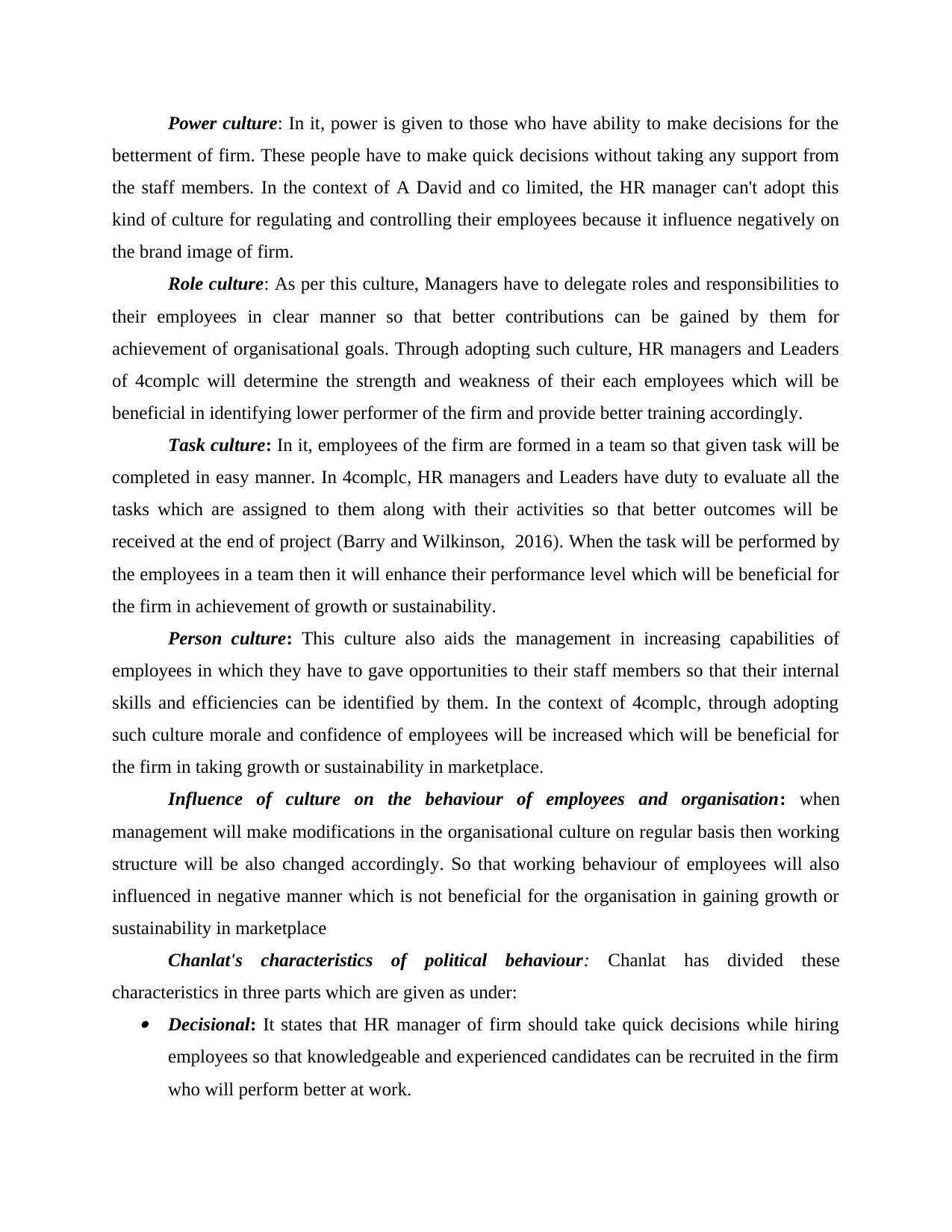
Power culture: In it, power is given to those who have ability to make decisions for the
betterment of firm. These people have to make quick decisions without taking any support from
the staff members. In the context of A David and co limited, the HR manager can't adopt this
kind of culture for regulating and controlling their employees because it influence negatively on
the brand image of firm.
Role culture: As per this culture, Managers have to delegate roles and responsibilities to
their employees in clear manner so that better contributions can be gained by them for
achievement of organisational goals. Through adopting such culture, HR managers and Leaders
of 4complc will determine the strength and weakness of their each employees which will be
beneficial in identifying lower performer of the firm and provide better training accordingly.
Task culture: In it, employees of the firm are formed in a team so that given task will be
completed in easy manner. In 4complc, HR managers and Leaders have duty to evaluate all the
tasks which are assigned to them along with their activities so that better outcomes will be
received at the end of project (Barry and Wilkinson, 2016). When the task will be performed by
the employees in a team then it will enhance their performance level which will be beneficial for
the firm in achievement of growth or sustainability.
Person culture: This culture also aids the management in increasing capabilities of
employees in which they have to gave opportunities to their staff members so that their internal
skills and efficiencies can be identified by them. In the context of 4complc, through adopting
such culture morale and confidence of employees will be increased which will be beneficial for
the firm in taking growth or sustainability in marketplace.
Influence of culture on the behaviour of employees and organisation: when
management will make modifications in the organisational culture on regular basis then working
structure will be also changed accordingly. So that working behaviour of employees will also
influenced in negative manner which is not beneficial for the organisation in gaining growth or
sustainability in marketplace
Chanlat's characteristics of political behaviour: Chanlat has divided these
characteristics in three parts which are given as under: Decisional: It states that HR manager of firm should take quick decisions while hiring
employees so that knowledgeable and experienced candidates can be recruited in the firm
who will perform better at work.
betterment of firm. These people have to make quick decisions without taking any support from
the staff members. In the context of A David and co limited, the HR manager can't adopt this
kind of culture for regulating and controlling their employees because it influence negatively on
the brand image of firm.
Role culture: As per this culture, Managers have to delegate roles and responsibilities to
their employees in clear manner so that better contributions can be gained by them for
achievement of organisational goals. Through adopting such culture, HR managers and Leaders
of 4complc will determine the strength and weakness of their each employees which will be
beneficial in identifying lower performer of the firm and provide better training accordingly.
Task culture: In it, employees of the firm are formed in a team so that given task will be
completed in easy manner. In 4complc, HR managers and Leaders have duty to evaluate all the
tasks which are assigned to them along with their activities so that better outcomes will be
received at the end of project (Barry and Wilkinson, 2016). When the task will be performed by
the employees in a team then it will enhance their performance level which will be beneficial for
the firm in achievement of growth or sustainability.
Person culture: This culture also aids the management in increasing capabilities of
employees in which they have to gave opportunities to their staff members so that their internal
skills and efficiencies can be identified by them. In the context of 4complc, through adopting
such culture morale and confidence of employees will be increased which will be beneficial for
the firm in taking growth or sustainability in marketplace.
Influence of culture on the behaviour of employees and organisation: when
management will make modifications in the organisational culture on regular basis then working
structure will be also changed accordingly. So that working behaviour of employees will also
influenced in negative manner which is not beneficial for the organisation in gaining growth or
sustainability in marketplace
Chanlat's characteristics of political behaviour: Chanlat has divided these
characteristics in three parts which are given as under: Decisional: It states that HR manager of firm should take quick decisions while hiring
employees so that knowledgeable and experienced candidates can be recruited in the firm
who will perform better at work.
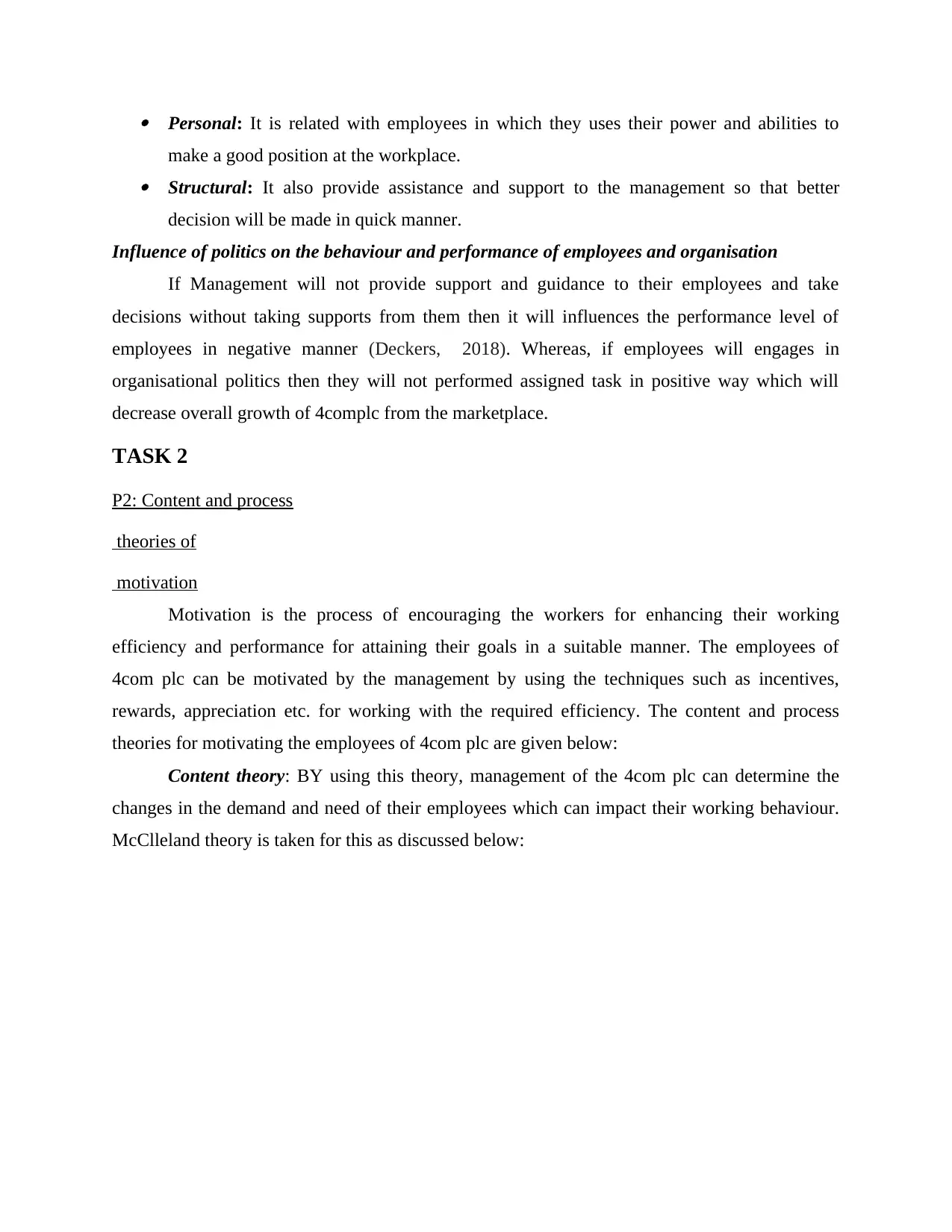
Personal: It is related with employees in which they uses their power and abilities to
make a good position at the workplace. Structural: It also provide assistance and support to the management so that better
decision will be made in quick manner.
Influence of politics on the behaviour and performance of employees and organisation
If Management will not provide support and guidance to their employees and take
decisions without taking supports from them then it will influences the performance level of
employees in negative manner (Deckers, 2018). Whereas, if employees will engages in
organisational politics then they will not performed assigned task in positive way which will
decrease overall growth of 4complc from the marketplace.
TASK 2
P2: Content and process
theories of
motivation
Motivation is the process of encouraging the workers for enhancing their working
efficiency and performance for attaining their goals in a suitable manner. The employees of
4com plc can be motivated by the management by using the techniques such as incentives,
rewards, appreciation etc. for working with the required efficiency. The content and process
theories for motivating the employees of 4com plc are given below:
Content theory: BY using this theory, management of the 4com plc can determine the
changes in the demand and need of their employees which can impact their working behaviour.
McClleland theory is taken for this as discussed below:
make a good position at the workplace. Structural: It also provide assistance and support to the management so that better
decision will be made in quick manner.
Influence of politics on the behaviour and performance of employees and organisation
If Management will not provide support and guidance to their employees and take
decisions without taking supports from them then it will influences the performance level of
employees in negative manner (Deckers, 2018). Whereas, if employees will engages in
organisational politics then they will not performed assigned task in positive way which will
decrease overall growth of 4complc from the marketplace.
TASK 2
P2: Content and process
theories of
motivation
Motivation is the process of encouraging the workers for enhancing their working
efficiency and performance for attaining their goals in a suitable manner. The employees of
4com plc can be motivated by the management by using the techniques such as incentives,
rewards, appreciation etc. for working with the required efficiency. The content and process
theories for motivating the employees of 4com plc are given below:
Content theory: BY using this theory, management of the 4com plc can determine the
changes in the demand and need of their employees which can impact their working behaviour.
McClleland theory is taken for this as discussed below:
⊘ This is a preview!⊘
Do you want full access?
Subscribe today to unlock all pages.

Trusted by 1+ million students worldwide
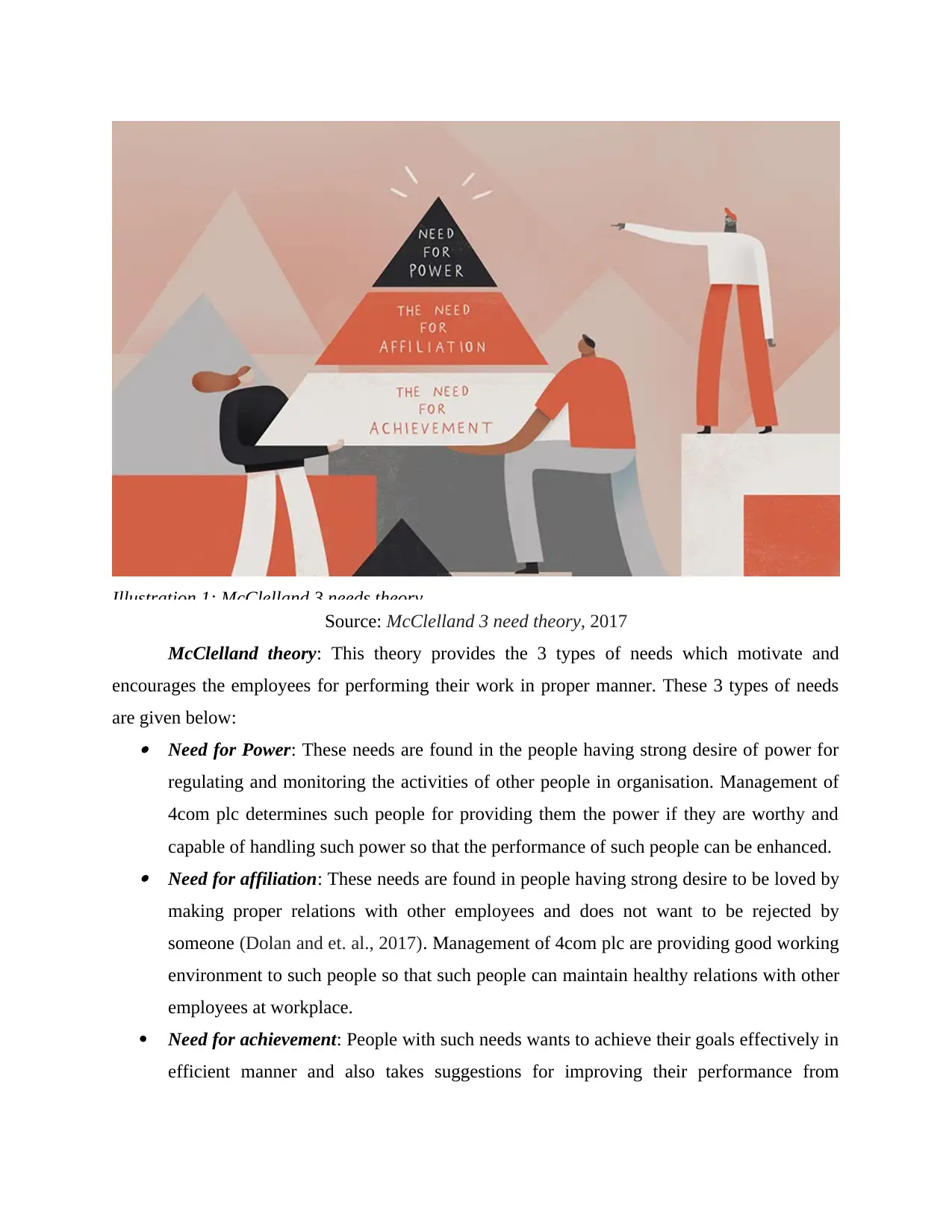
Illustration 1: McClelland 3 needs theory
Source: McClelland 3 need theory, 2017
McClelland theory: This theory provides the 3 types of needs which motivate and
encourages the employees for performing their work in proper manner. These 3 types of needs
are given below: Need for Power: These needs are found in the people having strong desire of power for
regulating and monitoring the activities of other people in organisation. Management of
4com plc determines such people for providing them the power if they are worthy and
capable of handling such power so that the performance of such people can be enhanced. Need for affiliation: These needs are found in people having strong desire to be loved by
making proper relations with other employees and does not want to be rejected by
someone (Dolan and et. al., 2017). Management of 4com plc are providing good working
environment to such people so that such people can maintain healthy relations with other
employees at workplace.
Need for achievement: People with such needs wants to achieve their goals effectively in
efficient manner and also takes suggestions for improving their performance from
Source: McClelland 3 need theory, 2017
McClelland theory: This theory provides the 3 types of needs which motivate and
encourages the employees for performing their work in proper manner. These 3 types of needs
are given below: Need for Power: These needs are found in the people having strong desire of power for
regulating and monitoring the activities of other people in organisation. Management of
4com plc determines such people for providing them the power if they are worthy and
capable of handling such power so that the performance of such people can be enhanced. Need for affiliation: These needs are found in people having strong desire to be loved by
making proper relations with other employees and does not want to be rejected by
someone (Dolan and et. al., 2017). Management of 4com plc are providing good working
environment to such people so that such people can maintain healthy relations with other
employees at workplace.
Need for achievement: People with such needs wants to achieve their goals effectively in
efficient manner and also takes suggestions for improving their performance from
Paraphrase This Document
Need a fresh take? Get an instant paraphrase of this document with our AI Paraphraser
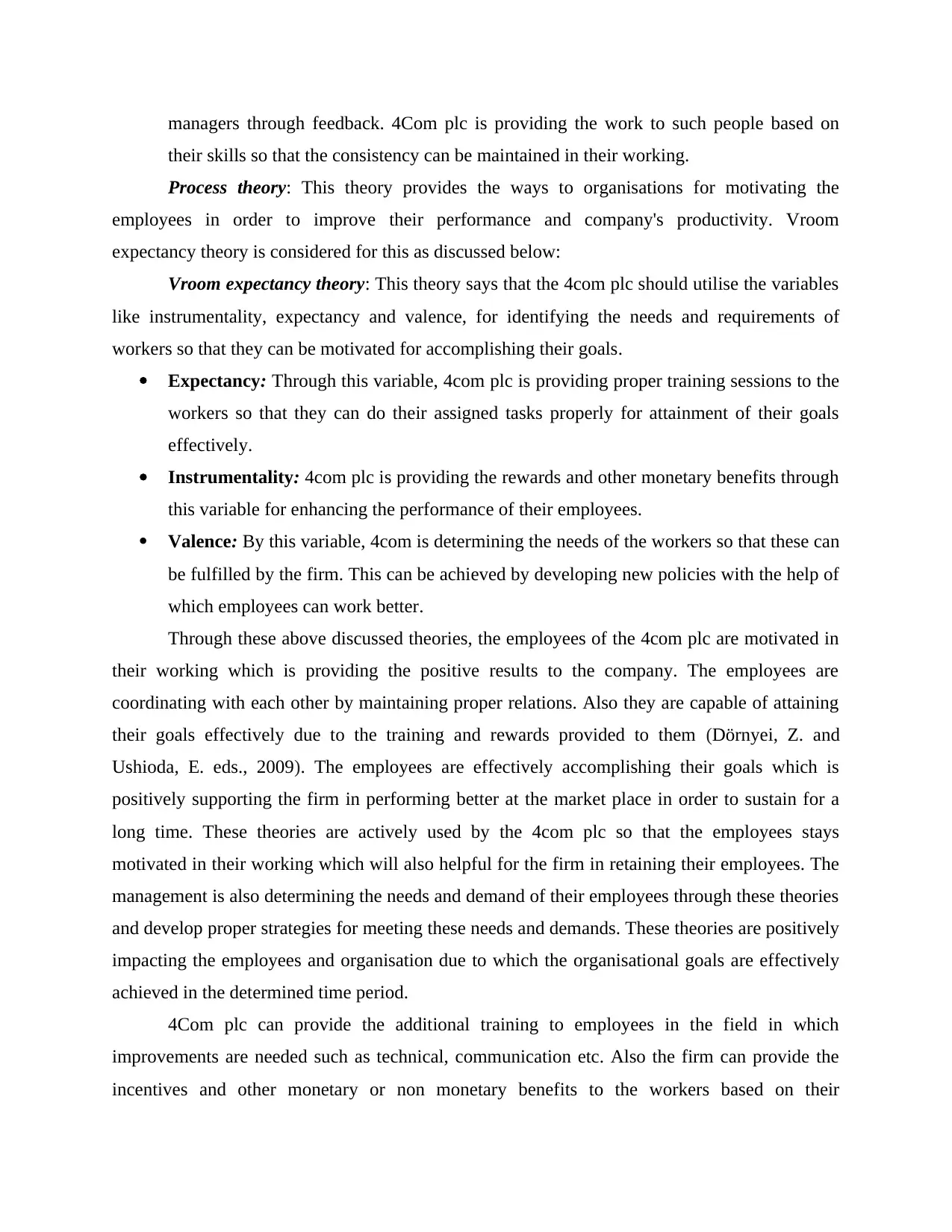
managers through feedback. 4Com plc is providing the work to such people based on
their skills so that the consistency can be maintained in their working.
Process theory: This theory provides the ways to organisations for motivating the
employees in order to improve their performance and company's productivity. Vroom
expectancy theory is considered for this as discussed below:
Vroom expectancy theory: This theory says that the 4com plc should utilise the variables
like instrumentality, expectancy and valence, for identifying the needs and requirements of
workers so that they can be motivated for accomplishing their goals.
Expectancy: Through this variable, 4com plc is providing proper training sessions to the
workers so that they can do their assigned tasks properly for attainment of their goals
effectively.
Instrumentality: 4com plc is providing the rewards and other monetary benefits through
this variable for enhancing the performance of their employees.
Valence: By this variable, 4com is determining the needs of the workers so that these can
be fulfilled by the firm. This can be achieved by developing new policies with the help of
which employees can work better.
Through these above discussed theories, the employees of the 4com plc are motivated in
their working which is providing the positive results to the company. The employees are
coordinating with each other by maintaining proper relations. Also they are capable of attaining
their goals effectively due to the training and rewards provided to them (Dörnyei, Z. and
Ushioda, E. eds., 2009). The employees are effectively accomplishing their goals which is
positively supporting the firm in performing better at the market place in order to sustain for a
long time. These theories are actively used by the 4com plc so that the employees stays
motivated in their working which will also helpful for the firm in retaining their employees. The
management is also determining the needs and demand of their employees through these theories
and develop proper strategies for meeting these needs and demands. These theories are positively
impacting the employees and organisation due to which the organisational goals are effectively
achieved in the determined time period.
4Com plc can provide the additional training to employees in the field in which
improvements are needed such as technical, communication etc. Also the firm can provide the
incentives and other monetary or non monetary benefits to the workers based on their
their skills so that the consistency can be maintained in their working.
Process theory: This theory provides the ways to organisations for motivating the
employees in order to improve their performance and company's productivity. Vroom
expectancy theory is considered for this as discussed below:
Vroom expectancy theory: This theory says that the 4com plc should utilise the variables
like instrumentality, expectancy and valence, for identifying the needs and requirements of
workers so that they can be motivated for accomplishing their goals.
Expectancy: Through this variable, 4com plc is providing proper training sessions to the
workers so that they can do their assigned tasks properly for attainment of their goals
effectively.
Instrumentality: 4com plc is providing the rewards and other monetary benefits through
this variable for enhancing the performance of their employees.
Valence: By this variable, 4com is determining the needs of the workers so that these can
be fulfilled by the firm. This can be achieved by developing new policies with the help of
which employees can work better.
Through these above discussed theories, the employees of the 4com plc are motivated in
their working which is providing the positive results to the company. The employees are
coordinating with each other by maintaining proper relations. Also they are capable of attaining
their goals effectively due to the training and rewards provided to them (Dörnyei, Z. and
Ushioda, E. eds., 2009). The employees are effectively accomplishing their goals which is
positively supporting the firm in performing better at the market place in order to sustain for a
long time. These theories are actively used by the 4com plc so that the employees stays
motivated in their working which will also helpful for the firm in retaining their employees. The
management is also determining the needs and demand of their employees through these theories
and develop proper strategies for meeting these needs and demands. These theories are positively
impacting the employees and organisation due to which the organisational goals are effectively
achieved in the determined time period.
4Com plc can provide the additional training to employees in the field in which
improvements are needed such as technical, communication etc. Also the firm can provide the
incentives and other monetary or non monetary benefits to the workers based on their
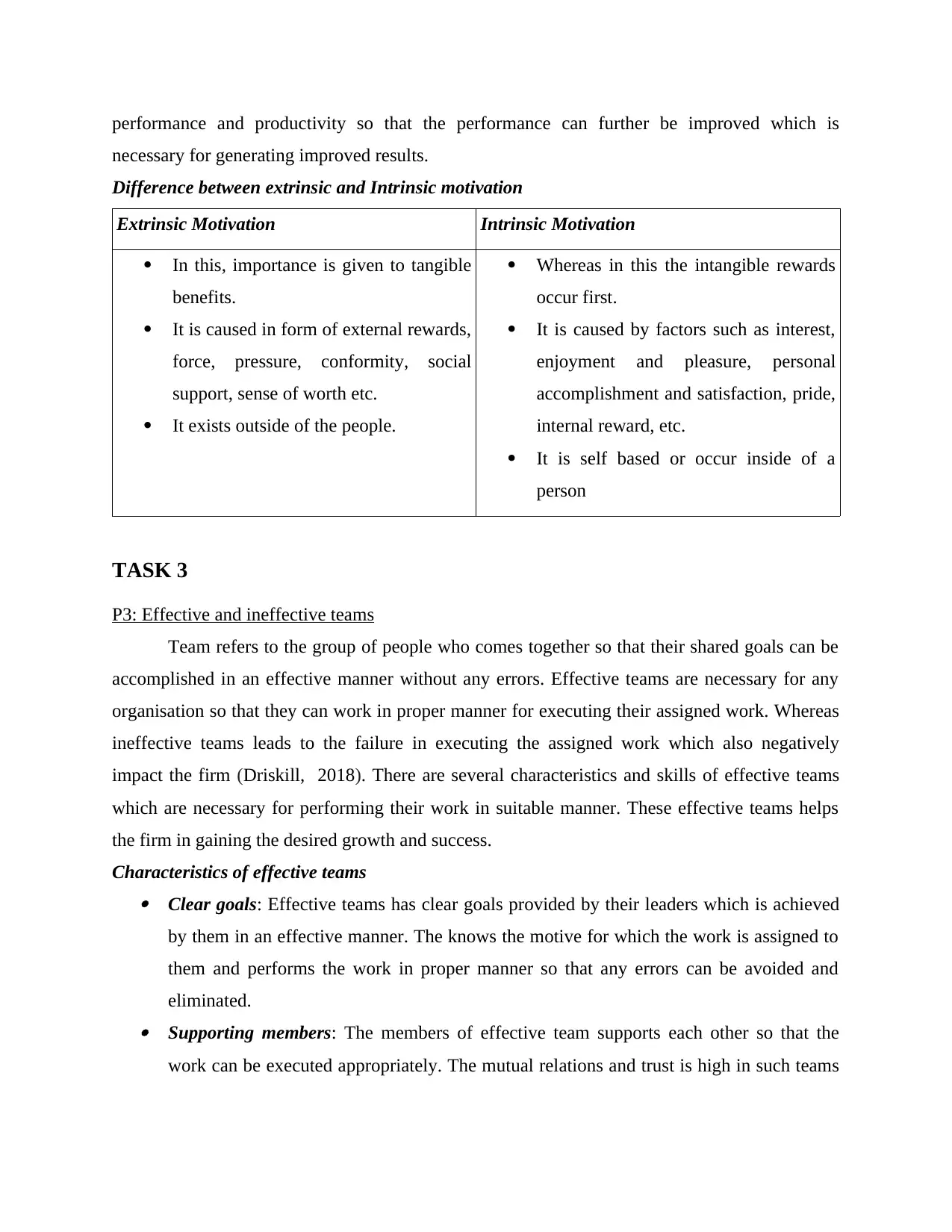
performance and productivity so that the performance can further be improved which is
necessary for generating improved results.
Difference between extrinsic and Intrinsic motivation
Extrinsic Motivation Intrinsic Motivation
In this, importance is given to tangible
benefits.
It is caused in form of external rewards,
force, pressure, conformity, social
support, sense of worth etc.
It exists outside of the people.
Whereas in this the intangible rewards
occur first.
It is caused by factors such as interest,
enjoyment and pleasure, personal
accomplishment and satisfaction, pride,
internal reward, etc.
It is self based or occur inside of a
person
TASK 3
P3: Effective and ineffective teams
Team refers to the group of people who comes together so that their shared goals can be
accomplished in an effective manner without any errors. Effective teams are necessary for any
organisation so that they can work in proper manner for executing their assigned work. Whereas
ineffective teams leads to the failure in executing the assigned work which also negatively
impact the firm (Driskill, 2018). There are several characteristics and skills of effective teams
which are necessary for performing their work in suitable manner. These effective teams helps
the firm in gaining the desired growth and success.
Characteristics of effective teams Clear goals: Effective teams has clear goals provided by their leaders which is achieved
by them in an effective manner. The knows the motive for which the work is assigned to
them and performs the work in proper manner so that any errors can be avoided and
eliminated. Supporting members: The members of effective team supports each other so that the
work can be executed appropriately. The mutual relations and trust is high in such teams
necessary for generating improved results.
Difference between extrinsic and Intrinsic motivation
Extrinsic Motivation Intrinsic Motivation
In this, importance is given to tangible
benefits.
It is caused in form of external rewards,
force, pressure, conformity, social
support, sense of worth etc.
It exists outside of the people.
Whereas in this the intangible rewards
occur first.
It is caused by factors such as interest,
enjoyment and pleasure, personal
accomplishment and satisfaction, pride,
internal reward, etc.
It is self based or occur inside of a
person
TASK 3
P3: Effective and ineffective teams
Team refers to the group of people who comes together so that their shared goals can be
accomplished in an effective manner without any errors. Effective teams are necessary for any
organisation so that they can work in proper manner for executing their assigned work. Whereas
ineffective teams leads to the failure in executing the assigned work which also negatively
impact the firm (Driskill, 2018). There are several characteristics and skills of effective teams
which are necessary for performing their work in suitable manner. These effective teams helps
the firm in gaining the desired growth and success.
Characteristics of effective teams Clear goals: Effective teams has clear goals provided by their leaders which is achieved
by them in an effective manner. The knows the motive for which the work is assigned to
them and performs the work in proper manner so that any errors can be avoided and
eliminated. Supporting members: The members of effective team supports each other so that the
work can be executed appropriately. The mutual relations and trust is high in such teams
⊘ This is a preview!⊘
Do you want full access?
Subscribe today to unlock all pages.

Trusted by 1+ million students worldwide
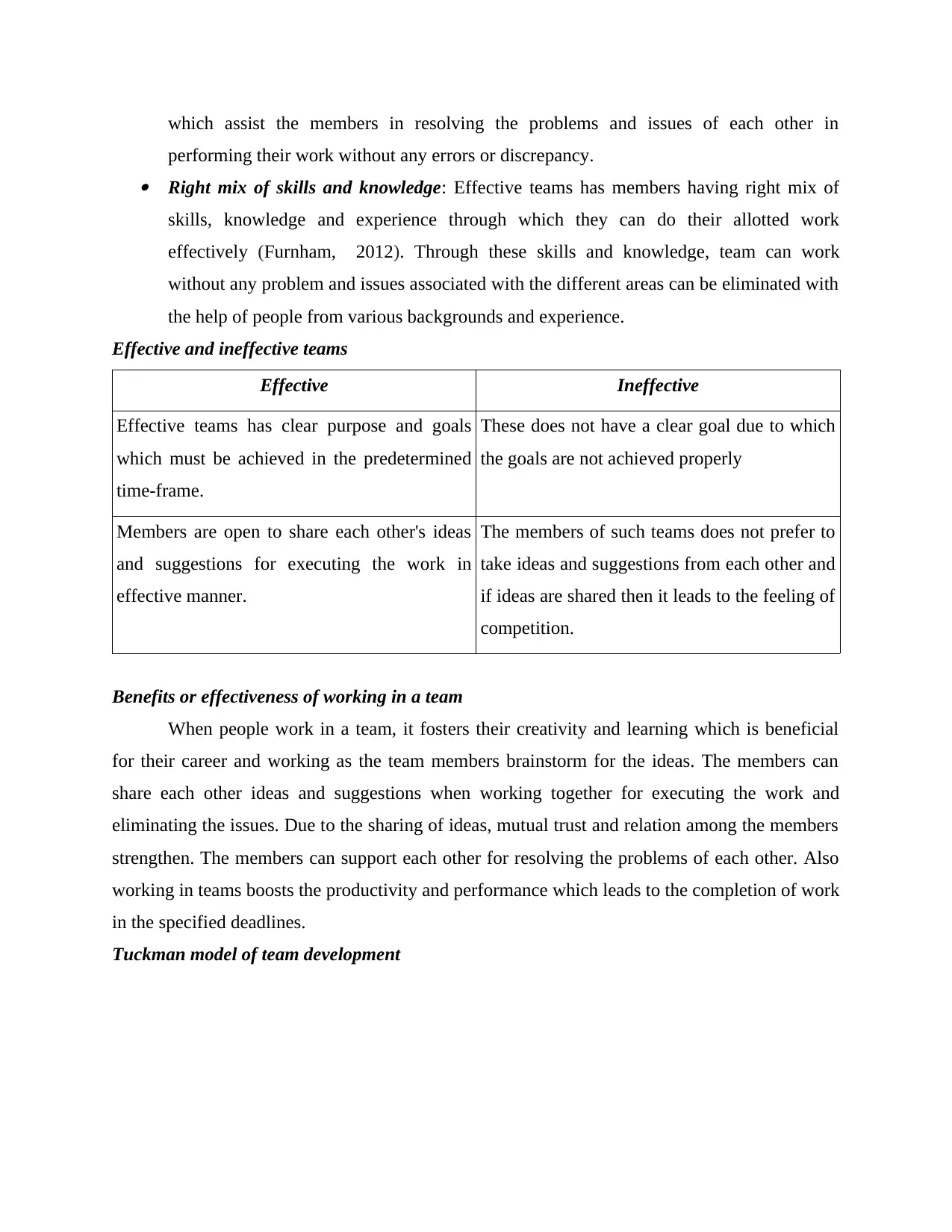
which assist the members in resolving the problems and issues of each other in
performing their work without any errors or discrepancy. Right mix of skills and knowledge: Effective teams has members having right mix of
skills, knowledge and experience through which they can do their allotted work
effectively (Furnham, 2012). Through these skills and knowledge, team can work
without any problem and issues associated with the different areas can be eliminated with
the help of people from various backgrounds and experience.
Effective and ineffective teams
Effective Ineffective
Effective teams has clear purpose and goals
which must be achieved in the predetermined
time-frame.
These does not have a clear goal due to which
the goals are not achieved properly
Members are open to share each other's ideas
and suggestions for executing the work in
effective manner.
The members of such teams does not prefer to
take ideas and suggestions from each other and
if ideas are shared then it leads to the feeling of
competition.
Benefits or effectiveness of working in a team
When people work in a team, it fosters their creativity and learning which is beneficial
for their career and working as the team members brainstorm for the ideas. The members can
share each other ideas and suggestions when working together for executing the work and
eliminating the issues. Due to the sharing of ideas, mutual trust and relation among the members
strengthen. The members can support each other for resolving the problems of each other. Also
working in teams boosts the productivity and performance which leads to the completion of work
in the specified deadlines.
Tuckman model of team development
performing their work without any errors or discrepancy. Right mix of skills and knowledge: Effective teams has members having right mix of
skills, knowledge and experience through which they can do their allotted work
effectively (Furnham, 2012). Through these skills and knowledge, team can work
without any problem and issues associated with the different areas can be eliminated with
the help of people from various backgrounds and experience.
Effective and ineffective teams
Effective Ineffective
Effective teams has clear purpose and goals
which must be achieved in the predetermined
time-frame.
These does not have a clear goal due to which
the goals are not achieved properly
Members are open to share each other's ideas
and suggestions for executing the work in
effective manner.
The members of such teams does not prefer to
take ideas and suggestions from each other and
if ideas are shared then it leads to the feeling of
competition.
Benefits or effectiveness of working in a team
When people work in a team, it fosters their creativity and learning which is beneficial
for their career and working as the team members brainstorm for the ideas. The members can
share each other ideas and suggestions when working together for executing the work and
eliminating the issues. Due to the sharing of ideas, mutual trust and relation among the members
strengthen. The members can support each other for resolving the problems of each other. Also
working in teams boosts the productivity and performance which leads to the completion of work
in the specified deadlines.
Tuckman model of team development
Paraphrase This Document
Need a fresh take? Get an instant paraphrase of this document with our AI Paraphraser
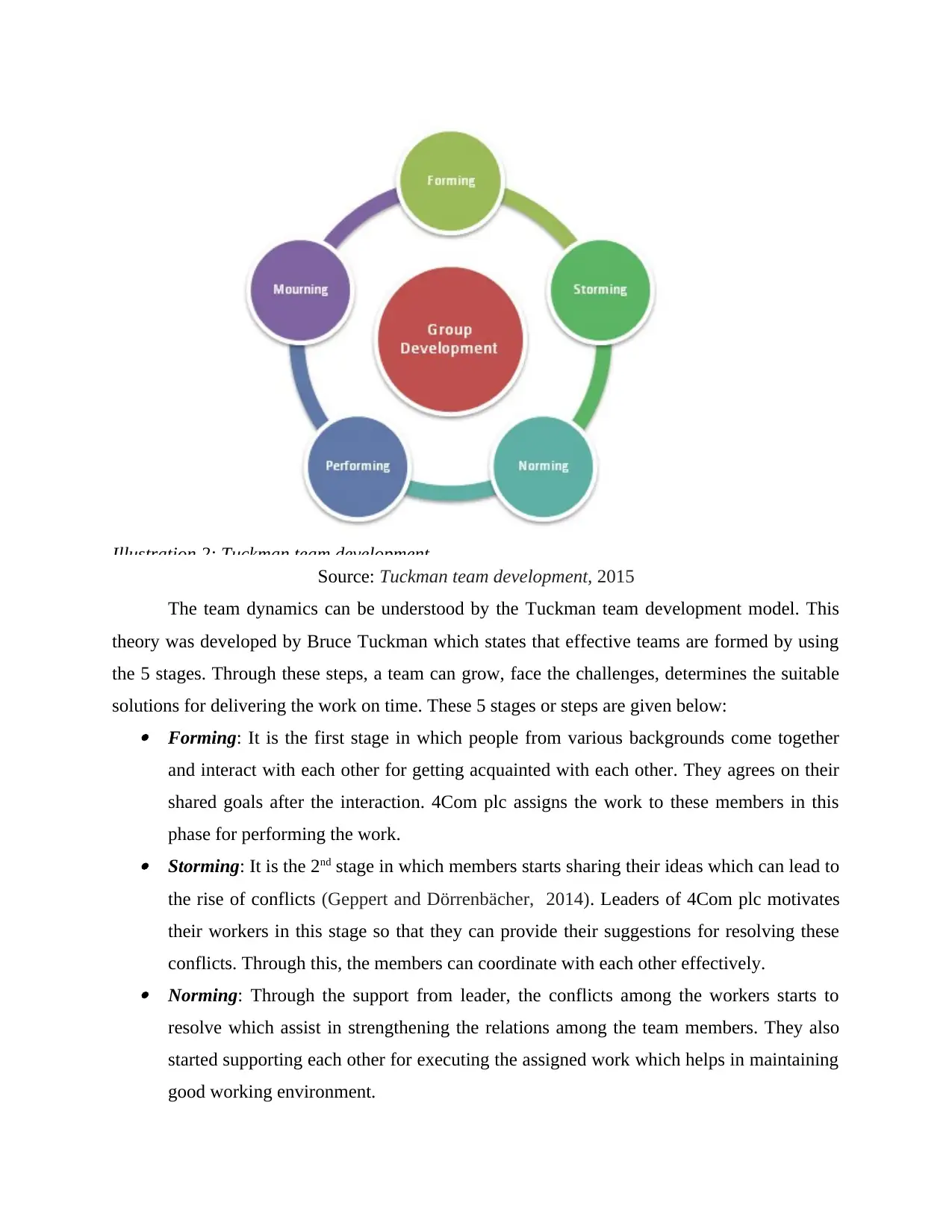
Illustration 2: Tuckman team development
Source: Tuckman team development, 2015
The team dynamics can be understood by the Tuckman team development model. This
theory was developed by Bruce Tuckman which states that effective teams are formed by using
the 5 stages. Through these steps, a team can grow, face the challenges, determines the suitable
solutions for delivering the work on time. These 5 stages or steps are given below: Forming: It is the first stage in which people from various backgrounds come together
and interact with each other for getting acquainted with each other. They agrees on their
shared goals after the interaction. 4Com plc assigns the work to these members in this
phase for performing the work. Storming: It is the 2nd stage in which members starts sharing their ideas which can lead to
the rise of conflicts (Geppert and Dörrenbächer, 2014). Leaders of 4Com plc motivates
their workers in this stage so that they can provide their suggestions for resolving these
conflicts. Through this, the members can coordinate with each other effectively. Norming: Through the support from leader, the conflicts among the workers starts to
resolve which assist in strengthening the relations among the team members. They also
started supporting each other for executing the assigned work which helps in maintaining
good working environment.
Source: Tuckman team development, 2015
The team dynamics can be understood by the Tuckman team development model. This
theory was developed by Bruce Tuckman which states that effective teams are formed by using
the 5 stages. Through these steps, a team can grow, face the challenges, determines the suitable
solutions for delivering the work on time. These 5 stages or steps are given below: Forming: It is the first stage in which people from various backgrounds come together
and interact with each other for getting acquainted with each other. They agrees on their
shared goals after the interaction. 4Com plc assigns the work to these members in this
phase for performing the work. Storming: It is the 2nd stage in which members starts sharing their ideas which can lead to
the rise of conflicts (Geppert and Dörrenbächer, 2014). Leaders of 4Com plc motivates
their workers in this stage so that they can provide their suggestions for resolving these
conflicts. Through this, the members can coordinate with each other effectively. Norming: Through the support from leader, the conflicts among the workers starts to
resolve which assist in strengthening the relations among the team members. They also
started supporting each other for executing the assigned work which helps in maintaining
good working environment.
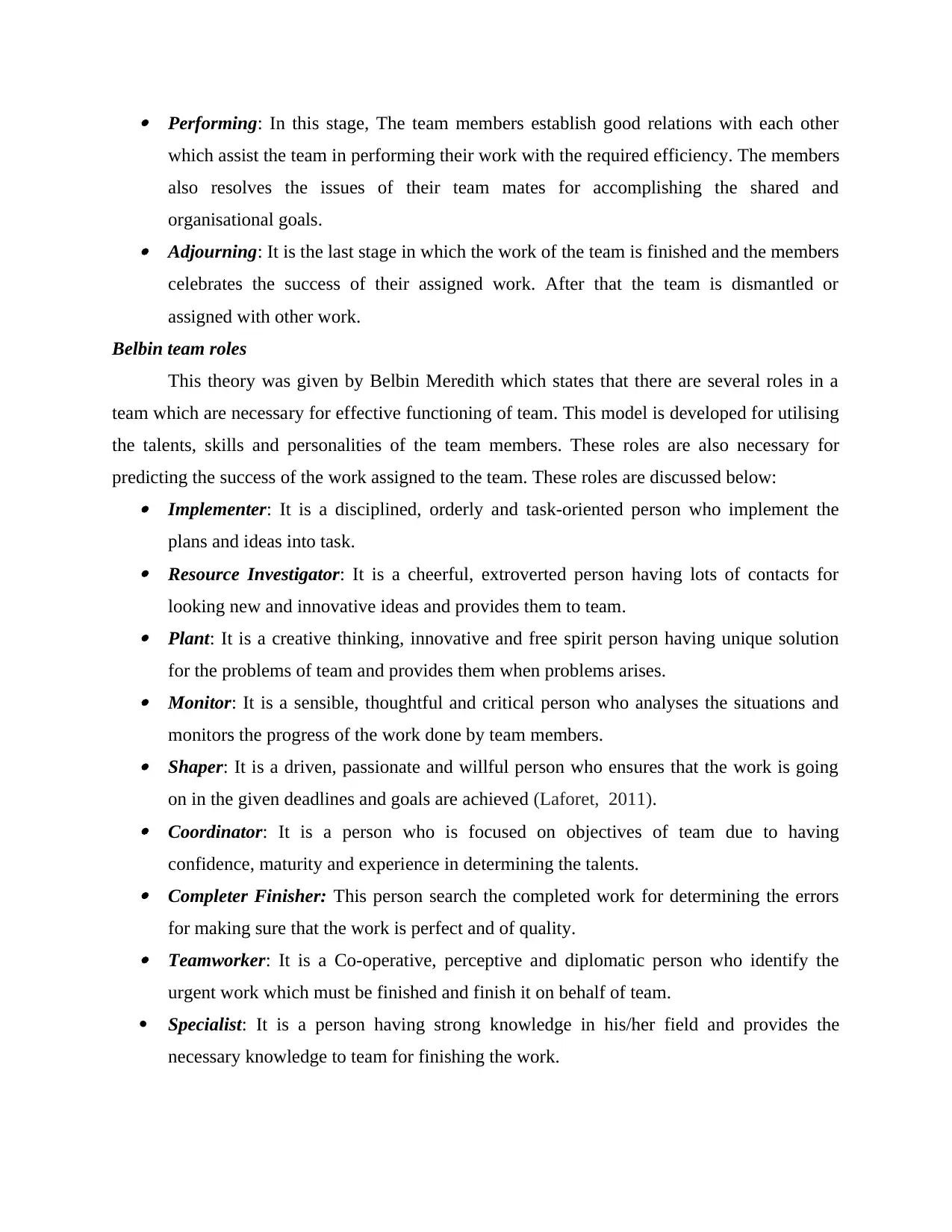
Performing: In this stage, The team members establish good relations with each other
which assist the team in performing their work with the required efficiency. The members
also resolves the issues of their team mates for accomplishing the shared and
organisational goals. Adjourning: It is the last stage in which the work of the team is finished and the members
celebrates the success of their assigned work. After that the team is dismantled or
assigned with other work.
Belbin team roles
This theory was given by Belbin Meredith which states that there are several roles in a
team which are necessary for effective functioning of team. This model is developed for utilising
the talents, skills and personalities of the team members. These roles are also necessary for
predicting the success of the work assigned to the team. These roles are discussed below: Implementer: It is a disciplined, orderly and task-oriented person who implement the
plans and ideas into task. Resource Investigator: It is a cheerful, extroverted person having lots of contacts for
looking new and innovative ideas and provides them to team. Plant: It is a creative thinking, innovative and free spirit person having unique solution
for the problems of team and provides them when problems arises. Monitor: It is a sensible, thoughtful and critical person who analyses the situations and
monitors the progress of the work done by team members. Shaper: It is a driven, passionate and willful person who ensures that the work is going
on in the given deadlines and goals are achieved (Laforet, 2011). Coordinator: It is a person who is focused on objectives of team due to having
confidence, maturity and experience in determining the talents. Completer Finisher: This person search the completed work for determining the errors
for making sure that the work is perfect and of quality. Teamworker: It is a Co-operative, perceptive and diplomatic person who identify the
urgent work which must be finished and finish it on behalf of team.
Specialist: It is a person having strong knowledge in his/her field and provides the
necessary knowledge to team for finishing the work.
which assist the team in performing their work with the required efficiency. The members
also resolves the issues of their team mates for accomplishing the shared and
organisational goals. Adjourning: It is the last stage in which the work of the team is finished and the members
celebrates the success of their assigned work. After that the team is dismantled or
assigned with other work.
Belbin team roles
This theory was given by Belbin Meredith which states that there are several roles in a
team which are necessary for effective functioning of team. This model is developed for utilising
the talents, skills and personalities of the team members. These roles are also necessary for
predicting the success of the work assigned to the team. These roles are discussed below: Implementer: It is a disciplined, orderly and task-oriented person who implement the
plans and ideas into task. Resource Investigator: It is a cheerful, extroverted person having lots of contacts for
looking new and innovative ideas and provides them to team. Plant: It is a creative thinking, innovative and free spirit person having unique solution
for the problems of team and provides them when problems arises. Monitor: It is a sensible, thoughtful and critical person who analyses the situations and
monitors the progress of the work done by team members. Shaper: It is a driven, passionate and willful person who ensures that the work is going
on in the given deadlines and goals are achieved (Laforet, 2011). Coordinator: It is a person who is focused on objectives of team due to having
confidence, maturity and experience in determining the talents. Completer Finisher: This person search the completed work for determining the errors
for making sure that the work is perfect and of quality. Teamworker: It is a Co-operative, perceptive and diplomatic person who identify the
urgent work which must be finished and finish it on behalf of team.
Specialist: It is a person having strong knowledge in his/her field and provides the
necessary knowledge to team for finishing the work.
⊘ This is a preview!⊘
Do you want full access?
Subscribe today to unlock all pages.

Trusted by 1+ million students worldwide
1 out of 15
Related Documents
Your All-in-One AI-Powered Toolkit for Academic Success.
+13062052269
info@desklib.com
Available 24*7 on WhatsApp / Email
![[object Object]](/_next/static/media/star-bottom.7253800d.svg)
Unlock your academic potential
Copyright © 2020–2025 A2Z Services. All Rights Reserved. Developed and managed by ZUCOL.





